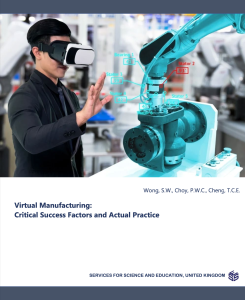Virtual Manufacturing: Critical Success Factors and Actual Practice
S. W. Wong, P. W. C. Choy, T. E. C. Cheng
- Keywords:
- Computer Sciences, Engineering.
- Abstract:
- Virtual manufacturing is an emerging manufacturing approach that is increasingly popular among manufacturers. Unlike the conventional approaches of outsourcing and/or subcontracting different aspects of the operations functions for the sake of cost reduction, the success of virtual manufacturing requires an in-depth understanding and innovative applications of operations strategies, supply chain management techniques, and business dynamics that are the key to operations management. On the other hand, the ongoing downturn in the global economy, together with such trends as rapidly changing customer behaviours and increasing demand from society, has rendered the manufacturing industry highly competitive. Therefore, it is necessary for virtual manufacturing firms to find ways to sustain their businesses and organizational performance. Identification of the critical capabilities of virtual manufacturing is the first step in this direction because it enables virtual manufacturing firms to understand the sources of their competitive advantage on the one hand, and to leverage their assets to achieve superior organizational performance on the other. The aim of this study is then to identify the critical capabilities of firms that adopt virtual manufacturing and understand their organizational performance implications. So far, studies on virtual manufacturing are limited. Specifically, few studies have been conducted to identify the critical capabilities of virtual manufacturing and examine how they are related to the virtual manufacturing firms’ organizational performance. To fill this gap, this study is undertaken whereby two lists of initial constructs of capabilities and organizational performance measures from the academic perspective (based on generic and industry-specific (manufacturing) perspectives) and practical perspective (based on focused groups in accordance with the Grounded Theory approach) were compiled. From the two lists, nine initial constructs containing 100 measurement indicators of capabilities and six initial constructs with 70 measurement indicators of organizational performance measures pertinent to virtual manufacturing were identified. Based on the identified initial constructs and their corresponding measurement indicators of capabilities and organizational performance measures, a structured survey questionnaire was designed for data collection and applied to conduct an organizational-level field study. The survey questionnaire was sent to 193 target respondent firms, selected suppliers of King’s Flair International (Holdings) Limited (SEHK: 6822.HK), to collect data. The survey returned 150 valid responses, which were analyzed by exploratory factor analysis to identify the potential critical capabilities and organizational performance measures pertinent to virtual manufacturing, and by multiple regression analysis to examine their relationships to determine the critical capabilities of virtual manufacturing and their organizational performance implications. Four critical capabilities, namely Technological Capability, Marketing Capability, Dynamic Capability, and Relationship Capability, and four organizational performance measures, namely Personnel Performance, Corporate Social Performance, Relationship Performance, and Marketing Performance were identified. The four critical capabilities are statistically associated with the four organizational performance measures at different levels of significance. Relationship Capability is the most prominent among the four critical capabilities as it is significantly associated with all the four organizational performance measures in the case of virtual manufacturing. A case study of King’s Flair International (Holdings) Limited was conducted to validate the statistical findings of this study, whereby the measures and practices undertaken to achieve superior organizational performance were critically reviewed and discussed. Another listed virtual manufacturing company in Hong Kong, the Li & Fung Limited (SEHK: 494.HK), was also studied for benchmarking purposes. This study contributes to research on virtual manufacturing from the academic perspective by identifying the critical capabilities of virtual manufacturing, and to the practice of virtual manufacturing from the application perspective by establishing the relationships among the critical capabilities and different organizational performance measures. This study also contributes to real-world operations management by providing guidance to virtual manufacturing firms on prioritizing and allocating resources for developing, maintaining, and enhancing their critical capabilities to attain superior organizational performance.

Published
- September 20, 2023
Categories
Copyright
- Copyright (c) 2023 Ilan Bijaoui
License
This work is licensed under a Creative Commons Attribution 4.0 International License.